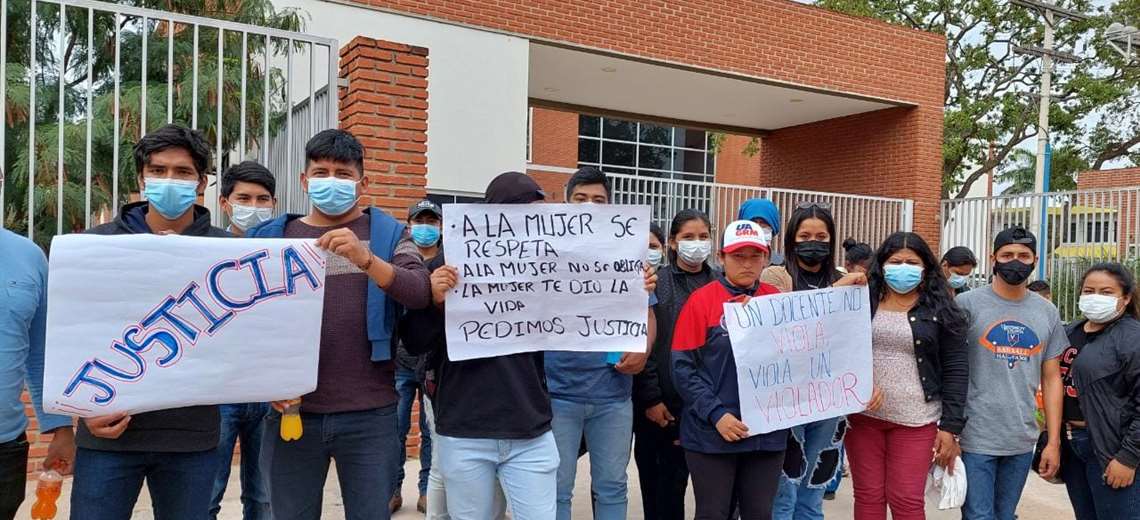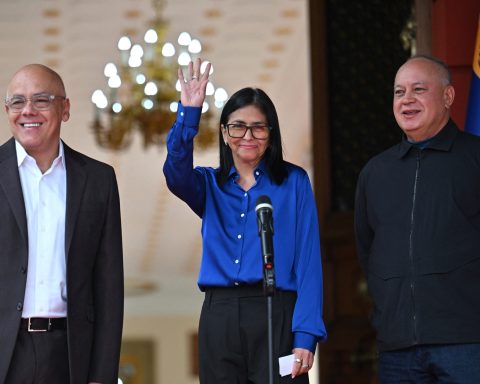Jenny Ampuero, professor of Social Communication at the Gabriel René Moreno Autonomous University, affirmed this Saturday that sexual harassment is a very naturalized ‘practice’ in this state house of studies, and that the complaints that are made in the face of these abuses most of the time do not amount to anything because there is a political protection between teachers, administrative staff and the students themselves.
Ampuero made these statements on the program ¡Qué Semana!, on EL DEBER Radio, as a result of the allegations of rape against a dean and a university professor, made by two students.
Carlos Villca is the denounced teacher, who was sent with preventive detention to Palmasola this Saturday, June 18. It is believed that there are six more victims of these officials from the Integral Faculty of Chiquitania (Faichi).
“Sexual harassment is very naturalized in the Uagrm,” said Ampuero. He told of teachers who touch their students in class or others who invite them to parties, or even call them on the phone with any pretext to talk to them. “This bullying is so much that the students already take it as natural. They say: ‘we don’t like it but this teacher is like that.’ boundary of that relationship with her student,” Ampuero said.
It’s a small ‘sample’
“What has happened in Chiquitania, with the dean and this teacher, has shown us that the cases are reaching a higher level,” Ampuero warned. “In the case of the Uagrm, we must take into account that we have more than 100,000 students and more than 1,500 teachers, and all this time we have been able to perceive that this problem of harassment exists, We are not going to say that it is only a few teachers who do this”said the teacher.
Ampuero mentioned that the biggest problem that the students have is that they do not have a place to file a complaint. “We have typified in the third section of the organic statute what we call the University Ombudsman, who has to be a teacher and a student, both elected by the Illustrious University Council (ICU), but until now the ICU has not elected him, we do not have University Defender. This statute also says that each faculty should have an advocate, but so far none has,” he pointed.
The only place left to them is the internal center of each race, but Ampuero observed that these centers are mostly made up of men. “Twenty years ago, two students came to me for support in a case. I told them to cheer up and give the names of those who harassed them. They did so. They went to the internal center and there they were told that they could not support her, no they could fight with the teachers. They went to an optional instance, they were not supported either. They went to the ICU and they were not supported either. Since then, many students have told me about cases of harassment they suffer and they do it in an even natural way, but they, from their experience, know that showing their faces and giving their names is useless, it only serves to discover them in front of a community that is also going to re-victimize them,” Ampuero said on the radio.
The teacher recalled that in 2018, in the Sociology career, a student was encouraged to denounce the harassment, she went to the last consequences, the teacher at the end apologized, but the only thing that was done was to change her career. Something that goes against Law 248, which says that he must be removed from his position as a public official.
High percentage of harassment
In 2018, the Sociology major carried out an investigation in the Faculty of Humanities and found that 86% of the students knew of at least one case of bullying.
There is also harassment of male students, teachers and administrators.
Ampuero pointed out that the complaints do not amount to anything most of the time because there is a protection pact, a political ‘compadrazgo’ between teachers, deans, administrative staff and students. “These are favors that have been done since the elections and that is ultimately charged when these situations occur,” said Ampuero.
He also mentioned that student unions are often taken over by ‘dinosaur’ students who choose younger students who are easily corrupted as their leaders. “The academic people are the ones who have never been in positions of power, but only the politicians,” argued Ampuero, who also lamented the low presence of women in the different student and administrative bodies.


















